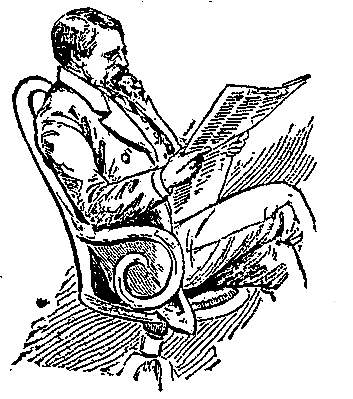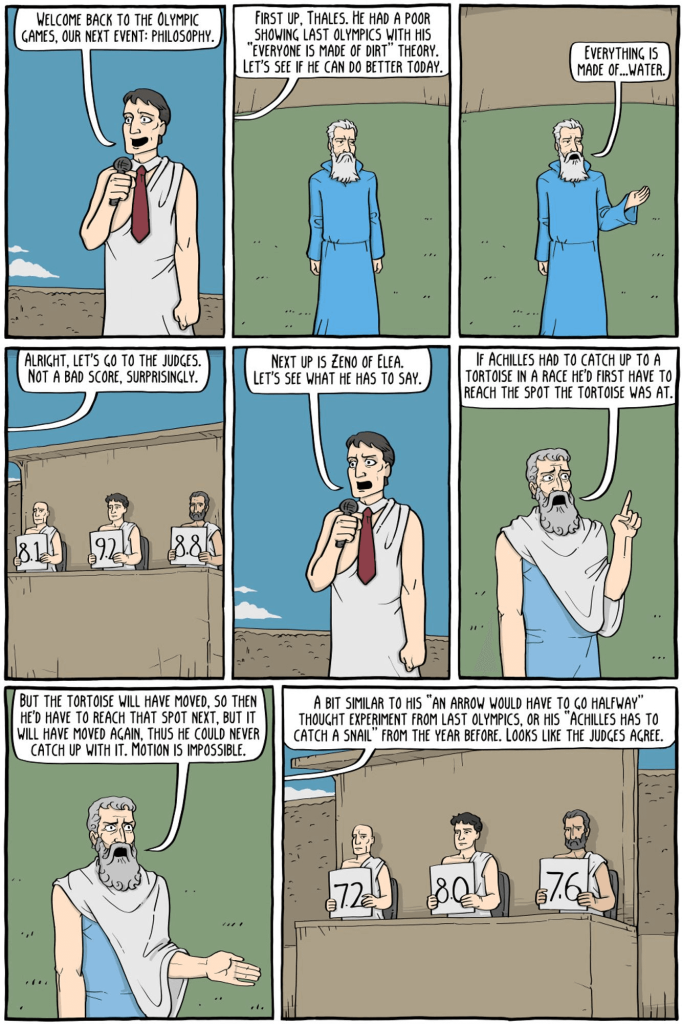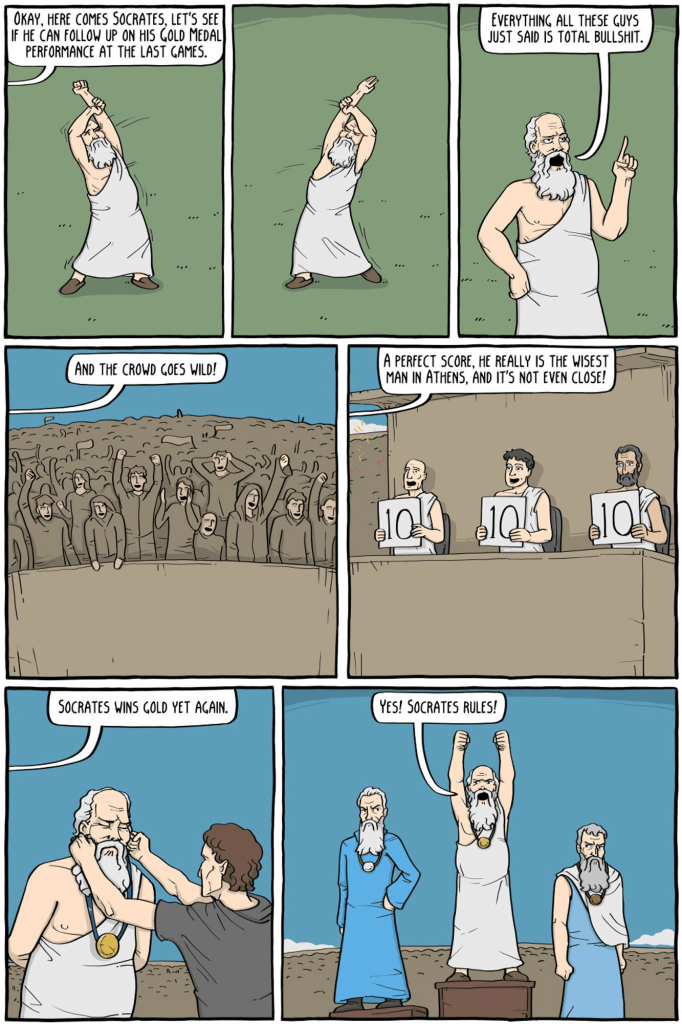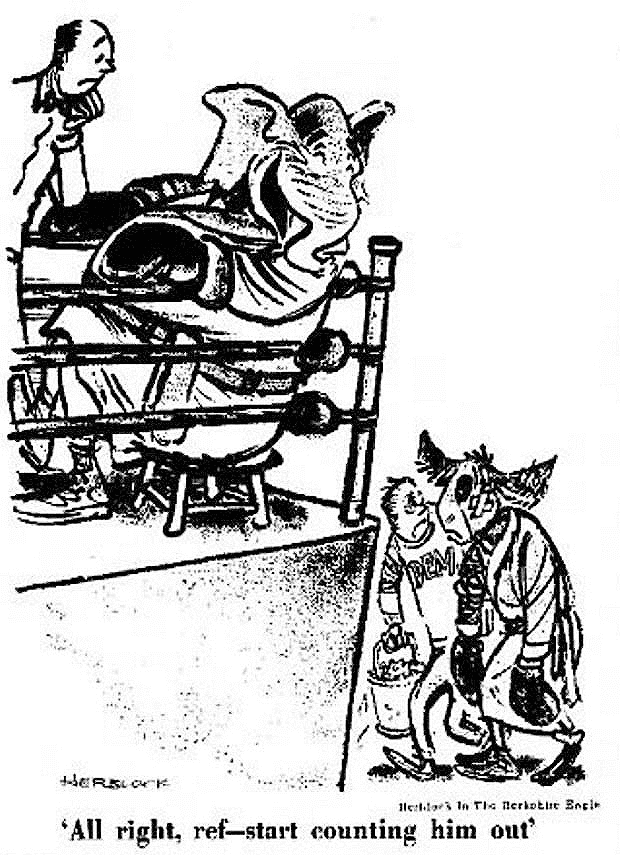CSotD: Sunday Humor Break
Skip to comments
Today’s Brewster Rockit (Tribune) got a chuckle but it brings up a topic I’ve been meaning to raise.
It’s no secret that newspapers are in deep trouble, in part because of changes in how people consume media but mostly because vulture capitalists decided to slaughter the goose so they wouldn’t have to wait for the golden eggs to be laid one day at a time.

As a result, cartoons and their creators are in not-so-great shape and it behooves those of us who like the medium to step up and, yes, upgrade to the premium plan. Not for every comic you read, but you should pick a few and help support them.
I’ve just posted a new copy of our list of cartoonists’ support sites here. Have a look and see if you can help some of your favorites keep on keepin’ on.
Meanwhile, cartoonists who have created Patreons, Substacks and other support sites for themselves should check to make sure they are on there and that their info is up-to-date. Let us know in the comments there if you want to be added or need an edit to an existing entry.
Now back to the show!

Speaking of Brewster Rockit, this past week featured a guest appearance by Laika, the Russian street dog who was sent into space in 1957 on Sputnik 2. The real story is sad, because there was as yet no means of safe re-entry and Laika died while in orbit.
However, that became a background and title theme for Lasse Hallstrom’s 1985 award-winning film, My Life as a Dog, about a young boy whose father is absent and whose mother is dying and who, himself, feels abandoned.
It sounds maudlin, but Hallstrom combined hilarity and tears in a highly memorable way. Here’s the trailer.
BTW, I didn’t describe Laika’s death as “tragic” because the word is overused by people who don’t know what it means. Aristotle wrote some dense stuff, but the Poetics were readable, and defining tragedy made the term far more significant than it sounds when thrown into every newscast by the hairspray brigade.


Existential Comics has a rare two-parter and I’d be reluctant to share the whole thing except that an excerpt would be incoherent and, besides, if you like this, you should have the site bookmarked, because the cartoons are consistently worthwhile.
The Apology was the first thing we read in seminar sophomore year, and it’s also taught in high school from time to time. It’s short, easy reading and is assigned for the same reason as To Kill a Mockingbird: You cannot possibly get the meaning wrong.
Though I notice that To Kill a Mockingbird has entered into “Hold My Beer” territory, with people insisting that you absolutely can get its message wrong if you really, really want to and are willing to try.
And I suppose if Dear Leader wins a second term, we’ll start executing people for corrupting youth by challenging them to think, and Socrates will find his works added to the banned books list.
Which won’t bother him because (A) he’s dead and (B) he didn’t write anything. And I’m willing to bet that most book-burners have never heard of Plato and think Lionel Hampton played the Xenophon.
Which is a joke. They’ve never heard of Lionel Hampton either.

I laughed at this Lockhorns (AMS) because if I’d written the gag, I’d have had to pause and make sure Beer Pong isn’t already recognized as an official Olympic sport. Just like I had to pause to find out if prancing around twirling ribbons is still an official Olympic sport.

Which it is, boyjazus. It even has its own logo or mascot or whatever.
Hang in, Leroy. Beer Pong will have its day.

Segueing into one of my unfulfilled marketing ideas, Speed Bump (Creators) brings up the notion of monogrammed underwear.
There was a time, O Best Beloved, when they marketed women’s underwear embroidered with the days of the week, so girls could wear Monday on Monday and so forth.
Or so I was told. I never saw it for myself because the kind of girl who felt compelled to do that was not the kind of girl who would let a guy see her underwear, which seems to undermine the whole point.
Anyway, counting on the sense of humor of the women who did let me see what they had on, or off, I had the idea of selling underpants that said January, February, March, April …
I’d have either made a fortune or I’d have wound up with a garage full of crates that didn’t weigh very much.

Paul Berge is saluting the 50th Anniversary of Tricky Dick’s departure from the White House with a fine collection of 1974 political cartoons on the subject.
This isn’t one of them; I offer it as a bonus because of its relation to the Washington Post’s uncovering of Tricky Don’s receipt of an illegal $10 million contribution from the Egyptian government.

And wotthehell, here’s another Herblock — this one from 1968 — for those who insist that the Democrats should have had a last-minute open primary, as a reminder of how well that worked when LBJ resigned and they beat the bushes, and their own children, in search of a replacement.

In this Moderately Confused (AMS), Jeff Stahler makes fun of a gas pump marketing thing that actually makes sense and does work, at least if you’re doing it right.
Irving offers a rewards card that you sweep as you would your credit or debit card, enter your four-digit passcode and get 10 cents a gallon off the price of gas. With gas close to $3.50 a gallon, that’s not a lot, but it’s enough to inspire brand loyalty, a worthy goal for their merchants.
The trick to all this is that, in applying for the card, you give them permission to directly debit your bank account. For you, it’s no different than using a debit card, but it saves them from paying the transaction fees.
Win-Win.
Granted, the place I go has a car wash, so, yes, they ask if I want a discounted wash, but at other Irving stations, it’s exactly the same as using a debit card.
It just costs less.
And that’s all right with me!


Comments 9
Comments are closed.